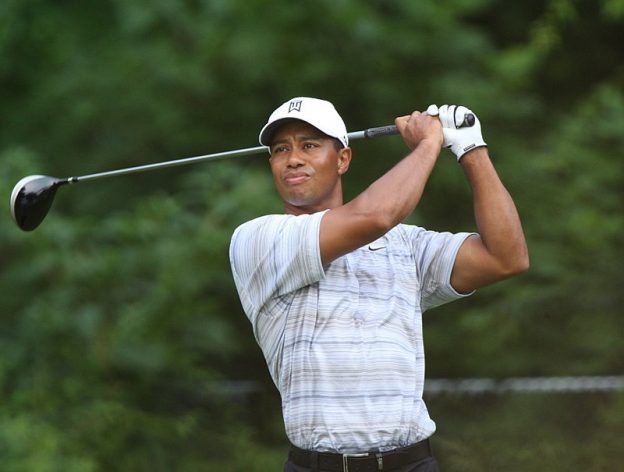Photo by Keith Allison / CC BY-SA 2.0
The Man, The Myth, The (Living) Legend
Tiger Woods: a name synonymous with record-breaking, crowd-pleasing golf greatness. Ironically, he’s the legend that young elite pros grew up idolizing. But the past several years have been riddled with question marks for Woods, now 43, who struggled for a long stretch to play competitively with the PGA’s new crop of young superstars. Fans and sports analysts have found plenty to debate regarding Tiger’s chances of making it back to the top amid such an elite group of younger, fitter players—and many have longed to see him get close to another major, huddling around the television whenever Tiger is in contention.
So, when he won the Masters at Augusta National in April (his first major win in 11 years), he celebrated in memorable fashion with his loved ones and caddy as cheers from the crowd pierced the air—and analysts got somewhat of an answer to their question. Yes, Tiger can still win majors. Yes, he can compete with the likes of Dustin Johnson, Justin Thomas, Rory McIlroy, and Brooks Koepka. In April, he helped to define himself as a living legend—one who has unfinished business with the record books and who still has a competitive chip on his shoulder. Yet, even as Tiger donned another green jacket at Augusta, analysts and media personalities were already speculating whether he could replicate the performance. Clearly, the pressure has been immense.
The “Old” Tiger vs. “The 2019 Tiger”
Since the Masters, Tiger has struggled; he missed the cut at both the PGA Championship and The Open Championship, and only a few days ago he withdrew from The Northern Trust at Liberty National Golf Club in Jersey City, New Jersey due to injury. His current #6 World Golf Ranking could be in jeopardy, to be sure. Furthermore, the inconsistency of his performance—along with injuries and lingering back issues—has made Tiger’s game difficult to anticipate. We’ve grown accustomed, during his 11-year majors slump, of seeing Tiger miss cuts or be forced to withdraw from tournaments due to injury (or re-injury). However, after his performance at the Masters, expectations have risen, and viewers have wondered whether “the old Tiger” is back for real.
The past few months since the Masters haven’t given much of an indication that Tiger is consistently playing on the level he was in April, though the role of injuries could certainly be a large factor in that. In any case, the year has given us very mixed signals about Tiger’s game, health, and consistency, all of which will be critical determining factors in his ability to reach the top again. Reports claim that Woods’ withdrawal from The Northern Trust was due to injury, but it is unknown whether Woods was also dealing with any pain or discomfort when he failed to make the cut at the PGA and The Open Championships.
Narrowing the Odds
Perhaps predicting Tiger’s success is akin to predicting who will make the NFL playoffs instead of trying to predict a specific Super Bowl winner. Tiger has shown that he still has elite golf in him, and on a given day, he’s likely to give the PGA’s elite all they can handle. However, it’s always difficult to tell which Tiger Woods will show up on the course—and equally as difficult to discern whether that Tiger will be present for 18 holes, much less the entire tournament.
That said, Tiger is clearly no slouch. It would be a bit irresponsible to completely write off an athlete who has fought his way back from injury so many times and, in many cases, has re-solidified himself as a top contender. After all, he’s solidly in the top-10-ranked golfers in the world. But aside from his history of injuries—including those that still affect him daily—as well as his inconsistency on the course, another factor stands as a roadblock to Tiger’s 16th major: Father Time.
A Year Older, A Year Wiser?
Caption: Is Tiger running out of time?
Of course, we’ve seen professional golfers have success at ages older than Tiger’s. After all, Julius Boros—the oldest man to win a major—won the PGA Championship at 48 years old. Still, at 43, one can imagine that the pressure is reaching new heights as Tiger, along with the rest of us, wonders to what degree he’s running out of time. Tiger is clearly fit and, outside of acute injuries, is in good health. Yet, one must wonder about the emotional and cognitive toll that such pressure imparts, as well as the slowing of reaction time that can occur with aging. Meanwhile, Woods’ 20-something counterparts—though they are clearly not as experienced as Woods—enjoy the health of youth (before the injury list reaches double-digits).
As much as I’d like to see Tiger finish his career on a high note—that is, with another major title—it will be a long, difficult path if it’s to happen at all. It’s no longer “the field against Tiger,” and the guys at the top know there’s a handful of players who could show up with a sharper game at any tournament. The threat is no longer just from Tiger—as several newcomers have emerged to fill the power gap during Tiger’s “absence”—and no singular figure stands head-and-shoulders above the field in 2019 (which is great for fans).
That said, I don’t see Woods fighting through the likes of Koepka, Johnson, Thomas, and McIlroy in 2020 (not in a major, anyway). There are just too many roadblocks and unknowns, and it would be a tough ask of Tiger, particularly if he’s still battling injuries, to show up in top form early next year.
Beyond 2020? It’s hard to say. I think Tiger has at least a few years left in him, and I doubt he’ll be quick to call it quits, so 2020 probably isn’t his last shot at winning another major. In fact, given his track record of recuperation, rehabilitation, and ambition, it’s possible that we’ll still see Tiger contending at age 50. It wouldn’t “shake the earth” again to see Tiger win a major next year, but it’s more likely that 2020 will be a revelatory one in Woods’ career. He’s proven to himself and the world that he’s still a championship-caliber player, and, after 11 years of only wishing, one would think that his Masters win would rejuvenate any lost motivation. While I don’t think Woods wins a major next year, I think he gets close. How he handles those pressure situations—and how often he deals with injury—will determine his chances for 2021.









